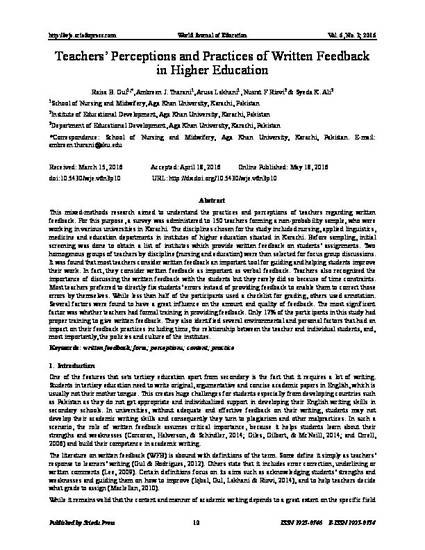
This mixed-methods research aimed to understand the practices and perceptions of teachers regarding writtenfeedback. For this purpose, a survey was administered to 150 teachers forming a non-probability sample, who wereworking in various universities in Karachi. The disciplines chosen for the study included nursing, applied linguistics,medicine and education departments in institutes of higher education situated in Karachi. Before sampling, initialscreening was done to obtain a list of institutes which provide written feedback on students’ assignments. Twohomogenous groups of teachers by discipline (nursing and education) were then selected for focus group discussions.It was found that most teachers consider written feedback an important tool for guiding and helping students improvetheir work. In fact, they consider written feedback as important as verbal feedback. Teachers also recognized theimportance of discussing the written feedback with the students but they rarely did so because of time constraints.Most teachers preferred to directly fix students’ errors instead of providing feedback to enable them to correct thoseerrors by themselves. While less than half of the participants used a checklist for grading, others used annotation.Several factors were found to have a great influence on the amount and quality of feedback. The most significantfactor was whether teachers had formal training in providing feedback. Only 17% of the participants in this study hadproper training to give written feedback. They also identified several environmental and personal factors that had animpact on their feedback practices including time, the relationship between the teacher and individual students, and,most importantly, the policies and culture of the institutes.
Available at: http://works.bepress.com/ambreen_tharani/4/